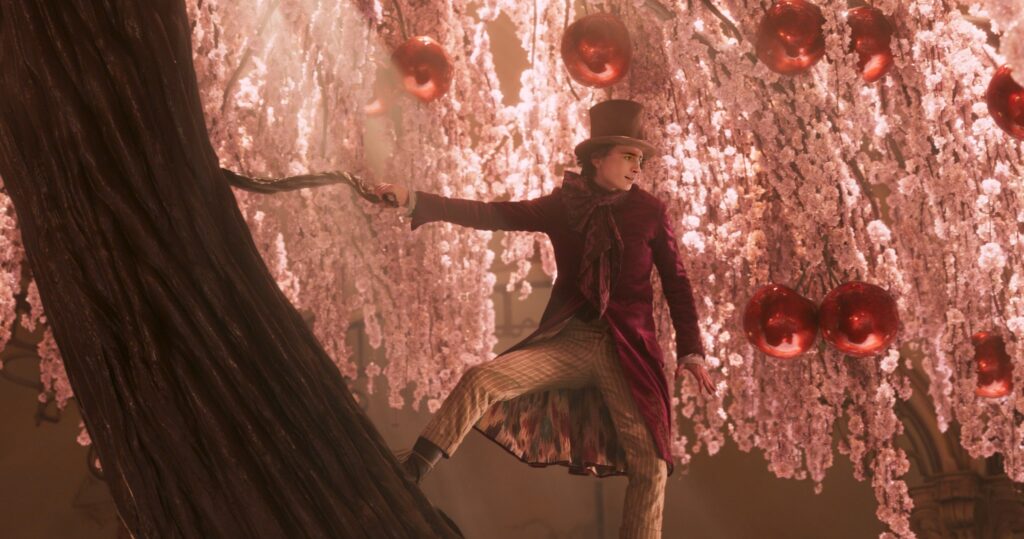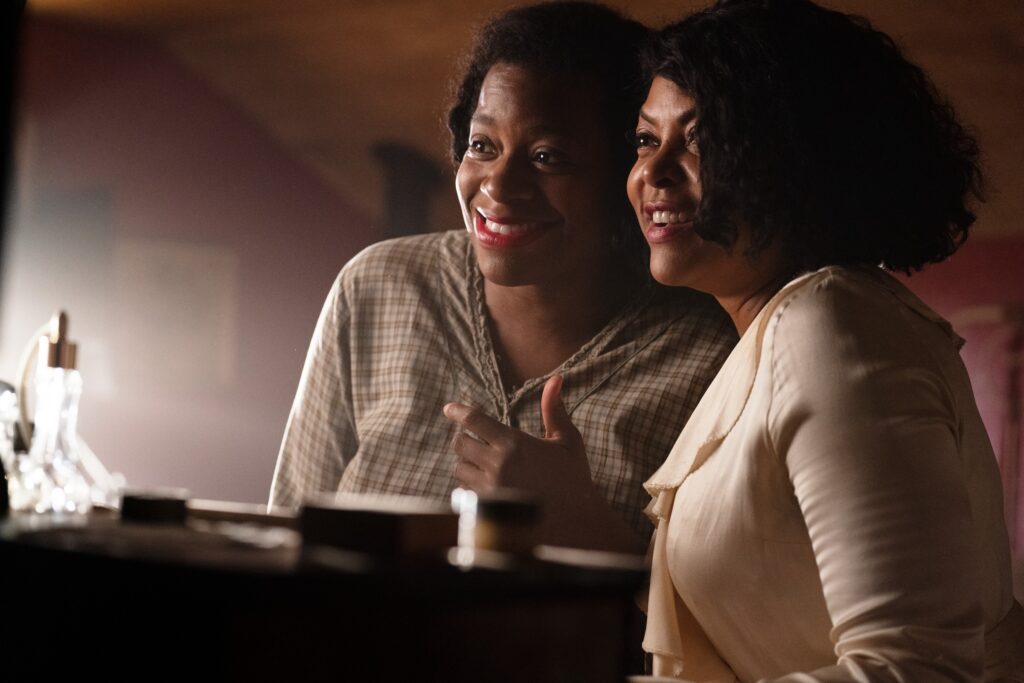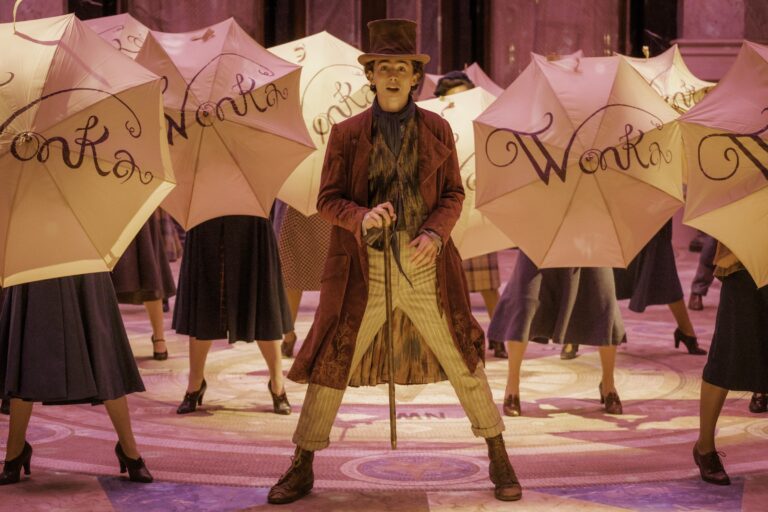The holidays are always a crowded time at the multiplex. This year brings a slate of movies begging for your attention, two of which are musicals even though their trailers try to keep that fact under wraps. Brief reviews below.

Wonka (2023 | USA | 116 minutes | Paul King)
I skipped the press screenings and held out for the Grand Reopening of Cinerama (now SIFF Downtown, thanks to the complexities of naming rights) to see Wonka, the saccharine origin story for Roald Dahl’s psychotic chocolatier. Maybe it’s just the rush of finally being reunited with my beloved chocolate popcorn, but I was won over by sheer force of Paul King’s hard stare Paddington magic in this musical treatment of what might be an alternate universe prequel. After a litany of speeches welcoming the crowd back to the temple of cinema, the movie finally got rolling with Timothée Chalamet speak-singing from atop a ship’s mast and entering a fantasy European city with just a few silver pieces and a head filled with dreams.
I turned to my friend in trepidation upon realizing that the much-maligned trailers were concealing that this children’s movie was really a musical: “They’re really doing this, huh?” But I still had a giant bag of popcorn to ease the shock, so I buckled in and gave King the benefit of the doubt.
For my own part, I am happy to say that once you accept how deranged this movie is, it really opens up into something truly astonishing. To wit: Timmy Chalamet is essentially playing a demon peddler of mind-altering drugs in a musical about the cruelties of English society and the injustices of crony capitalism, all without even being very good at singing?! It’s truly wild. There comes a time when he and an orphan break into a zoo to milk a giraffe, and somehow this is among the film’s most successful setpieces?
In a year that saw Wes Anderson making four exceptional Roald Dahl short films for Netflix that capture the author’s prickly wicked side, we also have Paul King saturating the screen with sweet and earnest songs. Chalamet’s off-kilter delivery and wiry dexterity makes the dreamer seem almost otherworldly. He’s got the Theater Kid Energy to make even the corniest lines work whether it’s deadpan or casual speak-singing. The performance is operating on an altogether different frequency, even amid a film populated by a rich array of fantastic faces, from the fantastic Olivia Colman to dozens of fantastic character actors who are never not going for it. Timmy’s Wonka is all wide eyed-optimism, but I could at least see hints of how that manic energy could take the heel turn to become Gene Wilder’s Wonka of Charlie and the Chocolate Factory. Oh, and Hugh Grant shows up as a Oompa Loompa and you can feel his regret at having taken the part in every hilarious frame. The meta-experience of considering these actors and what it must have felt like on set, really elevated this to one of the most surreal viewing experiences of the year. I think I loved it.

The Color Purple (2023 | USA | 140 | Blitz Bazawule)
Alas, the season’s other “secret musical” didn’t work for me at all. I was vaguely aware that there had been a long-running Broadway musical (and revival) based on Alice Walker’s epistolary novel of individual perseverance in the face of incestuous parental cruelty; spousal deception and abuse; awakening of suppressed sexuality; all in the setting of the abject structural racism of the post-Civil War’s American South. I was always perplexed as to why anyone would turn this book into a big stage show, and after seeing the film I am even more mystified on who thought this was an idea.
As Celie, the young woman whose own babies were uncermoniously taken from her by her (and their) father before she’s forced into a marriage with the town drunk, Fantasia Barrino suffers nobly while bringing her immense talents to a perpetually downtrodden role. She’s a veteran from the show’s Broadway revival and has the chops to make all the songs work and to sell the emotion of a stifled woman who refuses to quit. But something is lost in the film’s dutiful insistence on marching from insult to injury to get to the next production number. It has the feeling of a showy revue that simply doesn’t have the time or capability to explore the necessary delicacy of complex character development. It’s a heavy progression and an already weighty film is further burdened by the sense that director Blitz Bazawule and screenwriter Marcus Gardley don’t trust the audience to understand that the bad people in this movie are truly terrible. Sharp cuts, zooms, and close framing doubly underline and bludgeon every point in case anyone had somehow missed it. Any edges of the storytelling are dulled in service of eliminating any nuance or character depth. Colman Domingo, so dynamic in this year’s Rustin is trapped as in a role of one-dimensional cartoonish villainy as Celie’s abusive husband, Mister, who’s stubbornly awful right up until the moment the script demands otherwise as it suddenly checks it’s watch, realizes that it’s time to wrap it up, and hastily lurches toward an ending of barely-earned redemption. I don’t begrudge anyone a happy ending, but the mechanics of how it arrives at are borderline ludicrous.
There are some true glimmers amidst the mess. Taraji P. Henson seems so intent on having a good time that she makes the nonsensical Shug Avery character (deadbeat Mister’s mistress who’s also kind of Celie’s lover yet also fantastically wealthy through her independent showgirl career) work through sheer Cookie Lyon-esque force of will, even if the lesbian love story is severely underplayed. Danielle Brooks makes the leap from the Broadway revival and nobly reprises the film’s most unforgiving role as it doubles down on already senseless torment. And bless H.E.R. as Squeak (Mary Agnes) for being the only character with a backbone: a brief moment of fortitude is the film’s highlight.
Maybe it’s the rocky translation from a stage production where actors must give larger than life performances to play to the cheap(er) seats. But in the close-up grammar of film, the relentless series of jarring juxtapositions from depictions of abject misery interposed with song and dance make for an exhausting two and a half hour slog. Such incongruities might be forgivable if the songs were more memorable or the dancing was dynamic. The film is somehow way too long yet nowhere near well-developed enough to support its massive ambitions. In what seems to be an effort not to preserve a bit of everything from the stage show, there are too many plot lines and they all feel underserved. It’s a celebrated book that’s important to so many, but I think that Whoopi Goldberg (who made her celebrated film debut in Spielberg’s narrative adaptation) had the right idea: drop in for a cameo and get the heck out of there. I wish I’d followed her lead.
Wonka is now playing in theaters; The Color Purple opens on December 25th.
Images courtesy Warner Bros.



